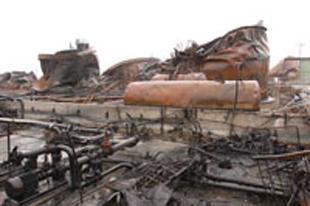
Report
Subject: Total abandons key pillar of its defence against a £700m lawsuit relating to the 2005 explosion Date of Email report: Wed 15/10/2008 Report Detail:
The surprising climbdown came as Total admitted to the High Court in London that damage caused by the explosion and the subsequent fire could have been predicted — a key pillar of establishing liability for negligence under English law. That meant that most of the local residents and small businesses involved in the case, located up to three kilometres away, still had to fight to prove their claims for "uninsured losses". Although those claims are collectively worth only £8 million — the bulk of the lawsuit relates to damage to large commercial operations and properties — lawyers for the local residents told the court last week that their clients had been forced to endure years of mental and physical distress. One family of seven was forced to move into a hotel on four separate occasions while they waited for their home to be rebuilt. Today's concession means that those claimants will almost certainly receive compensation. It also means that the focus of the trial will now shift to a fight between two of the world's biggest oil companies over who should foot the bill. Total, which is now facing a payout of hundreds of millions of pounds, argues that Chevron, its joint venture partner, should also share responsibility for the incident. Chevron owns 40 per cent of Hertfordshire Oil Storage Limited (HOSL), the company that operates the Buncefield plant. However, Chevron argues that it was merely a sleeping partner in the venture and that Total was in day-to-day control of the Buncefield facility. "Total proposes that the focal point of the current litigation should be to ensure that Chevron, its joint venture partner, properly faces up to its responsibilities as contained within the joint venture agreements so that both parties properly discharge their legal obligations to the claimants." But in a harshly-worded broadside, Jonathan Sumption, QC, acting for Chevron, said that statements by HOSL employees showed that they reported directly to Total and that the French company was responsible for operating the site. Total confirmed today that it had resolved another element of the case after settling its dispute with TAV Engineering, the manufacturer of a safety switch that allegedly contributed to the explosion. The explosion occurred in the early hours of the morning on December 11, 2005 after safety measures failed to prevent a petrol tank overflowing. The supervisor on duty at the time did not realise that the tank had overflowed. Des Collins, who represents the 272 local residents, said: "The residents are relieved that at last the Total defendants have accepted the ultimate futility of the position which they have sought to maintain for the last three years. "This has been a long and unnecessary struggle for the people of Hemel Hempstead. In light of this the trial judge has directed that further applications to the court should be made immediately in order that payments can start to be made to the residents." |

